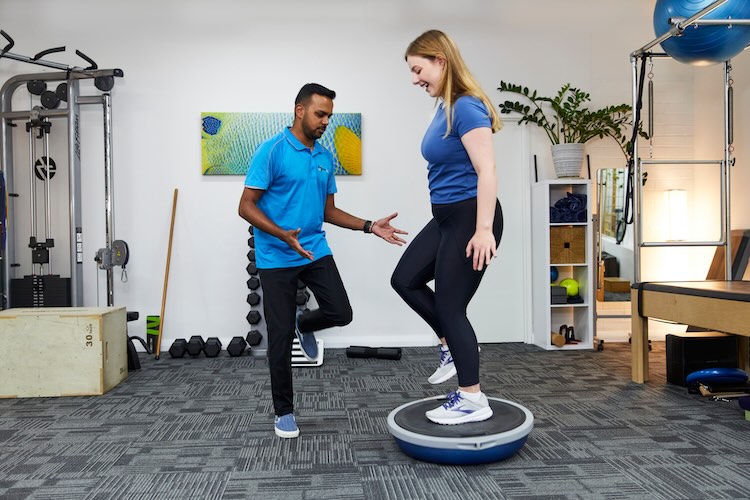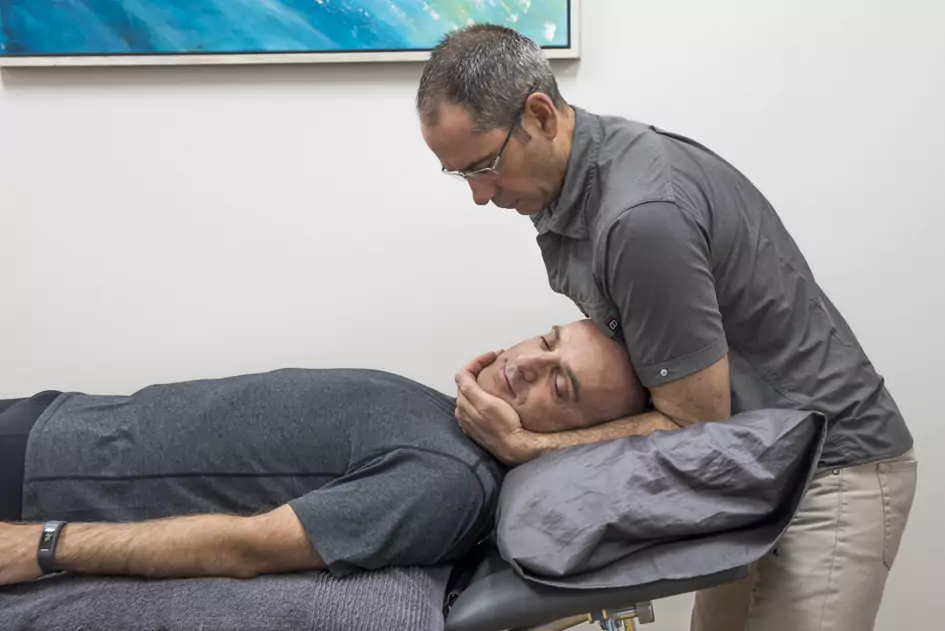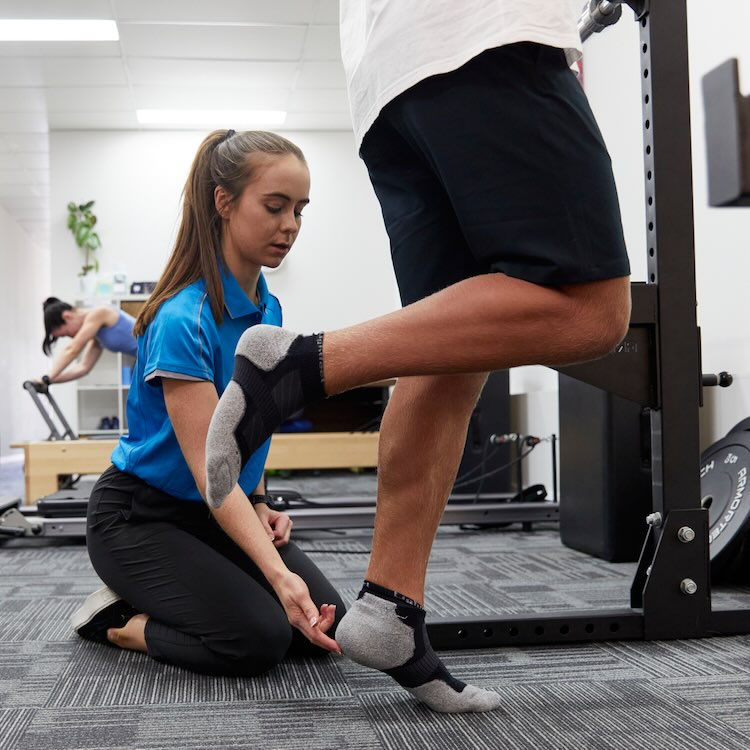3a/352 South Street O’Connor WA 6163 | (08) 93376460
Home » Physio Fremantle » Hypermobility Physio
Book with our multi-disciplinary team for expert hypermobility physio in Perth.
If you experience joint hypermobility, chronic pain, or instability, you may be dealing with Hypermobility Spectrum Disorder (HSD) or Ehlers-Danlos Syndrome (EDS). These conditions can cause joint pain, fatigue, dizziness, digestive issues, and poor proprioception, making daily activities challenging.
At Next Wave Therapy, we are experts in hypermobility physio, offering a multidisciplinary approach to improve joint stability, strength, and overall function. Our physiotherapists and occupational therapists create individualised treatment plans to help you move with confidence and reduce pain.
To book a consultation, simply click the button below and fill out our online booking form, or call us at 08 9337 6460.

Effective management starts with a thorough assessment by a qualified physiotherapist or occupational therapist. We evaluate:


Hypermobility requires ongoing management, and we ensure your treatment plan aligns with your goals. Our evidence-based approach includes:







Managing HSD and EDS requires a comprehensive, team-based approach. At Next Wave Therapy, we bring together highly skilled physiotherapists and occupational therapists, ensuring you receive holistic care tailored to your unique needs.

Dr. Wray specialises in managing complex musculoskeletal and sports injuries with a focus on swimming and surfing injuries.

Sasha has used an integrative approach to health care since 2000. She enjoys drawing from the Eastern and Western healing modalities to meet a persons needs to live well.

Rushil has a passion for treating athletes, with a special focus on golf, racquet sports, cricket, and gymnastics.

Amy specialises in injury rehabilitation and return-to-sport planning, with a focus on CrossFit, running, and cycling.

Carleen is passionate about empowering people of all ages to be able to manage their own health.
Hypermobility Spectrum Disorder (HSD) is a condition characterised by excessive joint movement due to weakened connective tissues. It falls on a spectrum of hypermobility-related conditions, ranging from general joint hypermobility to more complex connective tissue disorders like Ehlers-Danlos Syndrome (EDS).
Ehlers-Danlos Syndrome (EDS) is a hereditary connective tissue disorder that affects the body’s ability to produce strong, stable collagen. Collagen is essential for the strength and flexibility of joints, skin, and blood vessels, and when it is compromised, it can lead to pain, instability, and frequent injuries.
Common Symptoms of EDS:
Physiotherapy is essential for managing Hypermobility Spectrum Disorder (HSD) and Ehlers-Danlos Syndrome (EDS) by improving joint stability, strength, and movement control. People with hypermobility often experience pain, joint instability, and frequent injuries, which can impact daily activities. A targeted physiotherapy approach helps build muscle strength, enhance proprioception, and reduce pain, allowing for greater stability and confidence in movement.
Our physiotherapists use strength and stability training, pain management techniques, and movement retraining to help you regain control of your body. Treatment may include manual therapy, dry needling, taping, Pilates-based rehabilitation, and individualised strength programs designed to prevent injuries and improve function. By working alongside occupational therapists and other healthcare professionals, we ensure a comprehensive, long-term approach to managing hypermobility, helping you stay active and live pain-free.
Your initial consultation includes a thorough evaluation, where we take a detailed history and perform a physical assessment. We then provide a clear diagnosis and commence hands-on treatment. Additionally, you’ll receive a comprehensive management plan with prescribed exercises and advice on the recommended frequency and duration of your treatment.
For psychological therapy, we start with a comprehensive evaluation, including a detailed history and mental health assessment. Following this, we provide a clear diagnosis. You’ll also receive a thorough management plan, including guidance on the recommended frequency and duration of your treatment.
Your second consultation, scheduled shortly after the initial visit, allows for feedback and questions. We perform a streamlined re-evaluation through a physical assessment, helping you to see the benefits of the treatment. Subsequent consultations are designed to support your recovery and achieve optimal outcomes for your pain or injury.
For psychological therapy, the second consultation, also scheduled shortly after the initial visit, offers a chance for feedback and questions. A streamlined re-evaluation is conducted, allowing you to experience the benefits of the treatment. Subsequent consultations focus on supporting your recovery and achieving the best outcomes for your mental health.
Cancellations with less than 24 hours notice or non-attendance are billed at 50% of the consult fee and do not qualify for a rebate.
A doctor’s referral is generally not required unless your condition is associated with Workers Compensation, Motor Vehicle Injury, Veterans Affairs, or a Medicare Mental Health Care plan. In most cases, you can directly schedule an appointment since all our physiotherapists are primary contact practitioners capable of providing comprehensive care without a referral.
To access physiotherapy services through Medicare, you must have a referral from your GP under the Chronic Disease Management Plan, often referred to as an Enhanced Primary Care Plan (EPC). This plan is necessary for Medicare coverage when seeing a physiotherapist.
To access occupational therapy services through Medicare, you must have a referral from your GP under the Chronic Disease Management Plan (EPC) or a Mental Health Care Plan (MHCP). This plan is necessary for Medicare coverage when seeing an occupational therapist. For more information on eligibility and how to claim, refer to our schedule of fees explaining how Medicare can be used for occupational therapy.
As a person seeking healthcare in WA, you have the right to access, safety, respect, partnership, information, privacy, and the ability to provide feedback. For more detailed information on your rights, review the Australian Charter of Healthcare Rights.
We prioritise your privacy. Our strict privacy policy ensures the confidentiality of your personal information, using it solely for your healthcare. If you have any privacy concerns or questions, please reach out, and we’ll address them promptly. Your trust is crucial to us. Review our privacy policy here.